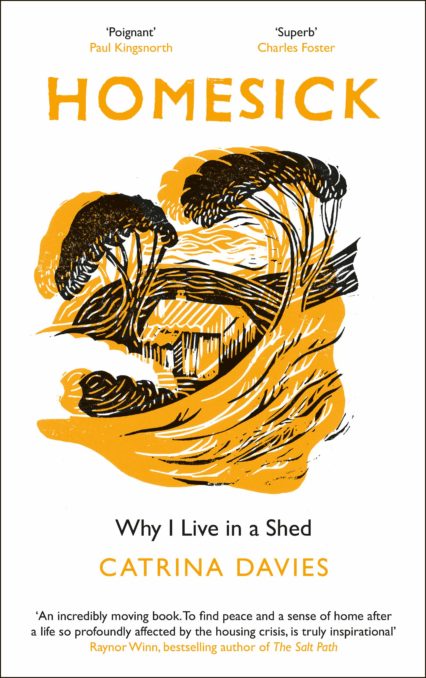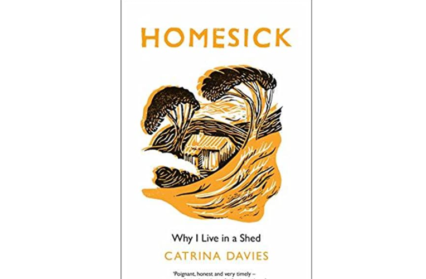Helen Pendry reviews Homesick: Why I Live in a Shed by Catrina Davies, a book which has been making a quiet impact in the communities of mid Wales.
Late last year a book called Homesick: Why I Live in a Shed was doing the rounds in my town, passing from hand to hand in pubs and dropping through letterboxes in the night.
It isn’t surprising that this memoir should appeal to people in mid Wales trying to live a full life in a rural economy during a housing crisis (and now a pandemic). The miracle is that the book exists at all, given the body-, mind- and soul-sapping effects of the author’s own housing insecurity and poverty.
 Davies is a writer, musician and lover of the Cornish coastline. Living in a shed was her personal answer to an impossible question: ‘how to balance on an economic system that is fundamentally unsound’. She grew up in Cornwall – her family moved to Land’s End from North Wales when she was five years old – and she wanted to settle there as an adult. She also wanted time to work on ‘the mostly unpaid business of hacking the meaning out of life with words and music’ … and to swim and to surf and to gather with friends around a fire on the beach at night and to watch the seals and listen to the birds.
Davies is a writer, musician and lover of the Cornish coastline. Living in a shed was her personal answer to an impossible question: ‘how to balance on an economic system that is fundamentally unsound’. She grew up in Cornwall – her family moved to Land’s End from North Wales when she was five years old – and she wanted to settle there as an adult. She also wanted time to work on ‘the mostly unpaid business of hacking the meaning out of life with words and music’ … and to swim and to surf and to gather with friends around a fire on the beach at night and to watch the seals and listen to the birds.
But she was skint and being skint means having nowhere to live. As she puts it: ‘If food prices had risen as fast as house prices since I came of age, a chicken would cost £51 (or £100 for those living in London)’. Buying a house was therefore out of the question – the average wage (at the time she wrote the book) for someone working full-time in Cornwall was £17,264 and the average house price was £200,000. Renting wasn’t an option either. A flat Davies looked at cost £500 a month plus bills and was only available if she agreed to move out at Easter and between June and October when the owner could make £500 a week renting the place to tourists.
Davies isn’t shy of suggesting political solutions to the problem, one of which would be taxing unearned land wealth. In her area of Cornwall, most of the land is owned by a lord who lives on an island and pays minimum wages to the workers in his tourism-related businesses, despite knowing that ‘nobody can live on minimum wage because he rents his houses and cottages out for far more than anyone who is being paid minimum wage could possibly afford to pay’. (Oh, and Land’s End isn’t owned by English Heritage or the National Trust but by a conglomerate of international oil companies. I didn’t know that.)
The struggle to change this unsound economic system – one which benefits a wealthy and powerful minority at the expense of providing decent and secure accommodation for all – is, of course, an ongoing collective struggle. But trying to survive – never mind thrive – within the system is an immediate and individual challenge. Davies says she didn’t want to spend her life ‘having to pretend to be enthusiastic about crap jobs’ just so she could afford a box room in a shared house in a city she had no connection with. Her imperfect solution to the impossible question, therefore, was a shed.
Living in the shed involved taking cold showers under an outside tap and dealing with rats and break-ins and the constant threat of eviction, but the shed belonged to Davies’ father (a story in itself), and therefore, more than her Cambridge degree or the minimum-wage jobs she managed to find, the shed and the bit of land it stood on gave her the chance to live life on her own terms.
Homesick is Davies’ account of the time she spent living in the shed, and she uses Henry David Thoreau’s Walden: or, Life in the Woods (first published in 1854) as inspiration and as a way of thinking about her choices and experiences. Thoreau moved into his self-built cabin in the woods to make a statement about the rampant materialism and soulless busyness of his own age. He subsisted on beans and bread and made notes on the changing seasons. He learnt to develop his awareness and take pleasure in simple things such as the sounds he heard around his cabin: the church bells ringing, birds singing, carriages rattling by on the road.
Davies is inspired by Thoreau’s confident lack of shame or defensiveness about the days he spends doing absolutely nothing, and she respects his activism (he refused to pay poll taxes because of his opposition to the Mexican-American War and slavery), but she’s also clear about the differences between her experiences and his. Whereas he chose to spend those two years living simply by a pond, Davies reckons she had ‘run out of other options’ and didn’t have the class background or family circumstances that would give her room to correct wrong turns and erase bad choices.
Like Thoreau, though, living on little in a shed by some water gave her more than she was looking for. For the first time, she writes, she began to feel at home in a way she had never felt in a house. And she began to understand ‘how the current housing crisis sweeping across many parts of the world is a symptom of a deeper homesickness, and how it’s also manifesting as crises in ecology, social justice and mental health’.
In that wider sense, Homesick is about hiraeth. It’s about the longing humans have to feel at home in the world – to feel welcome and rooted and connected with the environment and with the communities we are part of. But perhaps the Welsh word which encapsulates this beautiful, angry and life-affirming book’s themes more accurately is digon. Usually translated as ‘enough’, it also means ‘plenty’, and Davies’ book is an exploration of just how much is enough, and of how enough can be plenty, and of how ‘enough is enough’ of an unsound economic system which stunts lives, creates homelessness and devastates the planet.
Homesick: Why I Live in a Shed by Catrina Davies is available now from Hachette.
Helen Pendry is a writer, academic and editor.











